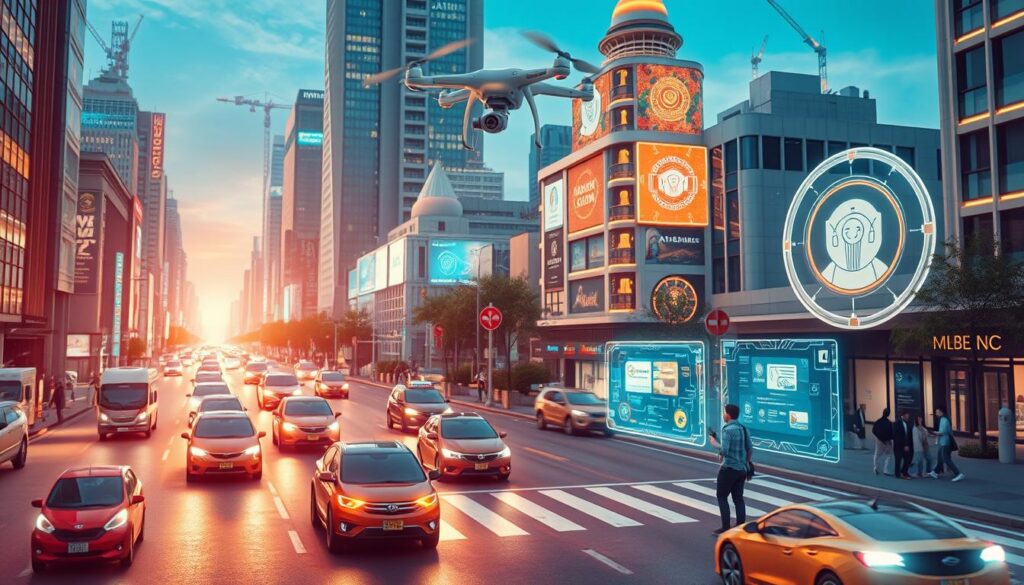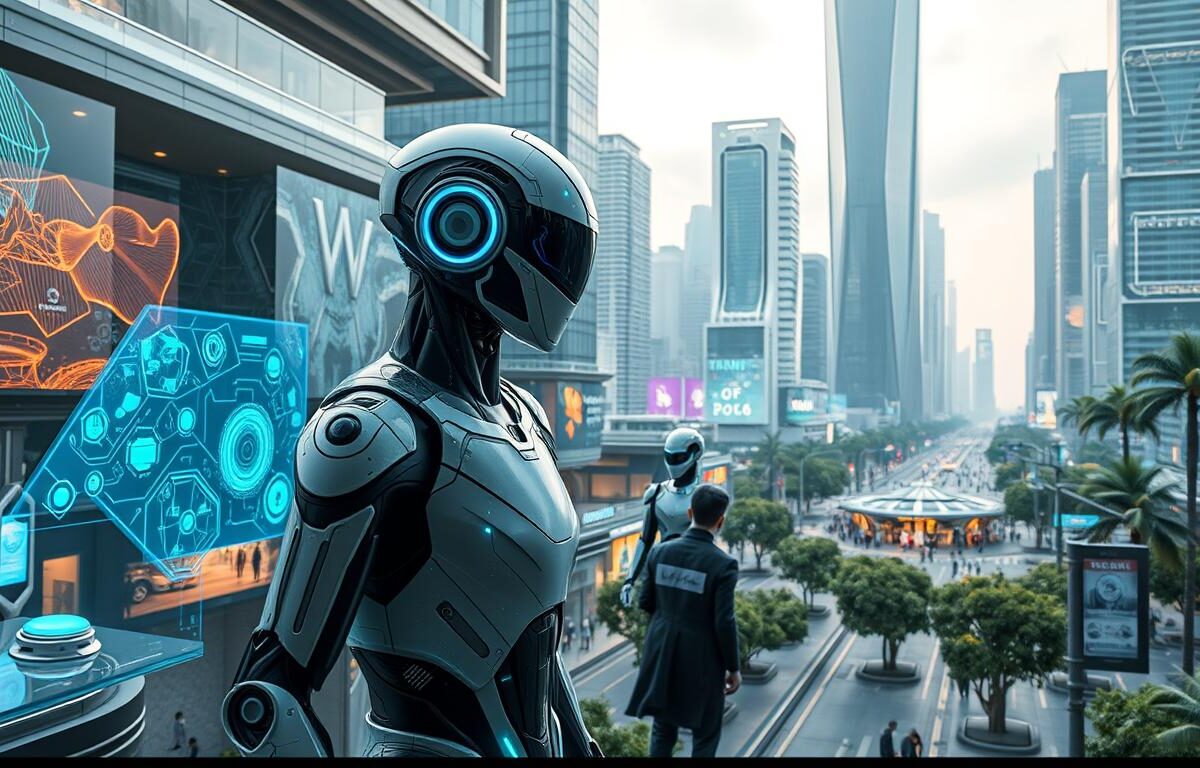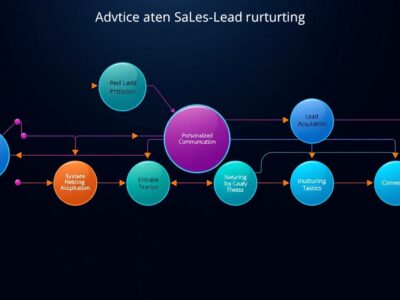AI agent technology is changing how industries operate by automating complex tasks. This includes improving how we communicate with machines. Companies like OpenAI and Cognition Labs are leading the change. They’ve moved us from simple chatbots to advanced, thinking agents. These agents can interact and make decisions on their own.
The use of AI is growing in everyday areas from autonomous driving to helping customers. This raises big questions about society and ethics. We’re diving into the present and future effects of AI agents on our world and technology.
Key Takeaways
- The integration of machine learning and natural language processing has advanced AI agents significantly.
- Large language models by OpenAI, such as GPT-3, showcase a remarkable ability to generate human-like text.
- AI virtual assistants like ChatGPT can now engage in human-like conversations and assist in diverse tasks.
- AI agents are revolutionizing customer service by handling high inquiry volumes 24/7.
- Future enhancements in AI accuracy and reinforcement learning promise continuous advancement in AI agent technology.
Understanding AI Agents
AI agents are changing the way businesses work. They use machine learning and natural language processing to take on tasks on their own. This makes them very important in our digital world. By using AI, companies can get better at what they do and make smarter choices.
Key Characteristics
AI agents have traits that make them adaptable and efficient. The main ones are:
- Autonomy: They work by themselves, needing little help from humans.
- Reactivity: They quickly react to changes around them.
- Proactivity: They can foresee needs and act to make things better.
- Social Ability: They can communicate well with people and other agents.
How Do AI Agents Work?
AI agents learn from data and make decisions on their own. They do this by:
- Gathering data through perception systems.
- Analyzing and understanding data with complex algorithms.
- Making choices based on what they’ve learned.
- Acting on these decisions without human help.
This process helps AI agents on platforms like virtual agents to work better and smarter. They scale up easily and offer valuable insights.
Types of AI Agents
There are different kinds of AI agents, each with its unique role:
| Type of AI Agent | Characteristics | Example Usage |
|---|---|---|
| Simple Reflex Agents | Work using set rules and situations. | Automating simple tasks like setting up meetings. |
| Model-Based Reflex Agents | Have an internal model to check conditions. | Used for keeping an eye on the environment. |
| Goal-Based Agents | They aim to reach certain goals with their actions. | Guiding robots. |
| Utility-Based Agents | Decide things based on outcomes to get the best results. | Tools for analyzing investments. |
| Learning Agents | Get better over time by learning. | Search engines that adapt to you. |
AI agents are used in many areas, from healthcare to finance. They help increase productivity, improve decisions, and cut costs.
The Evolution of AI Agents
Artificial Intelligence (AI) has changed a lot over time. It went from basic systems to today’s smart, autonomous agents. These changes have started a new era. This era is reshaping industries and making user experiences better.
From Rule-Based Chatbots to Intelligent Assistants
In the beginning, AI was simple and rule-based, only making basic chatbots. These early versions relied on fixed scripts. They couldn’t understand context or learn. Now, we have intelligent assistants. They can have real conversations and do complex tasks.
Key advancements include:
- Reactive Machines: Simple AIs that respond to certain inputs with set actions.
- Limited Memory Agents: They make decisions with a bit of recent information.
- Theory of Mind Agents: They understand emotions and intentions, making human interaction better.
- Self-Aware Agents: These AIs recognize they exist and make choices on their own.

The Rise of Large Language Models
Large language models like GPT-3 changed how chatbots and AI interact. They use a lot of data. This lets them act and understand like humans. AI can now talk in complex ways and do tasks with little help from us.
Large language models have many benefits:
- They adapt better to changes.
- They make smarter choices by remembering past events.
- They learn in different ways, like on their own or through trial and error.
Anthropic and the Push for Safe AI Agents
Making AI safer is also crucial. Companies like Anthropic lead this effort. They make sure AI helps society while being moral.
Considerations in safe AI development include:
- AI working well with little help from us.
- AI meeting our unique needs through customization.
- Different AI working together smoothly, using things like AgentLayer.
Anthropic shows a complete view of AI. They mix skill with morality. This shapes a future where AI works well and safely.
Current Applications of AI Agents
AI agents are improving many industries in big ways. They help make customer service better, support software developers, and assist in analyzing data and making decisions.
Customer Service and Chatbots
AI chatbots are changing customer service by providing fast and smart replies. Brands like Sephora use these chatbots on Facebook Messenger. They can handle many customer questions, allowing humans to focus on harder problems.
In e-commerce, automated customer service has cut down support tickets by 65%.
Software Development Assistance
Virtual assistants like GitHub Copilot are a big help in software development. They suggest code and help with repetitive tasks. This makes development faster and helps keep coding standards high, improving productivity and innovation.
Data Analysis and Decision Making
In data analysis and decision-making, AI agents are very important. For example, JP Morgan uses AI to find and stop fraud. This has cut fraud by 70%, saving about $200 million each year.
AI agents for predictive maintenance have helped Siemens. They’ve cut downtime by 40% and raised productivity by 10%. These examples show how AI tools can make decisions better, improving how things run.
| Company | Application | Impact |
|---|---|---|
| Sephora | AI-powered customer chatbots | Improved customer interaction and reduced support tickets |
| GitHub | Copilot (Intelligent virtual assistant) | Enhanced developer productivity by suggesting code snippets |
| JP Morgan | AI fraud detection | 70% reduction in fraud, saving $200 million annually |
| Siemens | Predictive maintenance AI agents | 40% reduction in downtime, 10% increase in productivity |
Future Advancements and Potential
The future of AI technology is full of promise. It looks forward to better accuracy and smarter reasoning thanks to machine learning and quantum AI technology. These advances are set to make AI agents more capable and independent in solving complex problems.
Improving AI Accuracy and Reasoning
Improving how AI agents understand, work together, and solve problems is a key goal. Machine learning helps these agents learn on their own, improving their reasoning with little help from humans. This big step forward is even faster than Moore’s Law and shows how quickly progress is happening.
Reinforcement Learning
Reinforcement learning is a key part of AI’s present and future. It lets AI agents learn by trial and error, which helps them make better choices. Over time, they get even better, useful in many areas like loans, coding, and online marketing.
Integration with Quantum Computing
Merging quantum AI technology with current AI could change the game. It could make AI agents solve problems much faster, boosting their work in science and business. This blend of AI and quantum computing could lead to major breakthroughs, especially when many AI agents work together.
Big tech companies are investing over $1 trillion in AI agents. This shows a big change, focusing on skills more than tools. It’s shaking up the usual software models, moving towards an agent-based economy. For instance, Casetext’s jump to a $650 million value after launching Co-Counsel shows AI’s big impact. New developments, like better prompting and working with multiple agents, have boosted AI agents’ growth in the last two years.
| Aspect | 2022-2023 Milestones | Future Projections |
|---|---|---|
| Technological Advancements | Unsupervised learning, chain-of-thought prompting | Quantum AI integration, enhanced multi-agent systems |
| Investment | $1 trillion by tech giants | Continued growth, emphasizing AI agent capabilities |
| Capabilities | Improved reasoning and problem-solving | Greater autonomy and efficiency |
Machine learning and AI reinforcement learning are paving the way for a big change. Along with quantum AI, they promise a future where AI agents can transform industries and make them more efficient.
AI Agent Technology in Business
AI agent technology is transforming businesses. It brings advanced solutions that improve many business areas. This technology is key for efficiency, lowering costs, and sparking innovation.
Transforming Customer Service
AI-powered chatbots are changing customer service. They provide help all day and night without needing people.
Companies like Amazon and Microsoft use AI for better customer talks. This makes customers happier. Chatbots guess what customers need. They give quick and right answers. This makes the service better.
Revolutionizing Sales and Marketing
In sales and marketing, AI gives insights. It makes things run smoother.
Sales get better with AI because it finds leads and improves ads. Salesforce uses Agentforce for better sales work. This leads to big gains in how much is sold.
Creating New Markets and Opportunities
AI is not only improving what we have. It’s also opening new chances.
With AI, businesses are doing things we never thought were possible. Companies like Legendary Entertainment and Hughes Network Systems use AI to grow in new areas. AI agents bring new strengths and make industries better.
Conclusion
AI agent technology is changing tech and society in big ways. As AI grows, it will increase our computational power and how we apply it in different areas. For example, businesses are moving to AI-first approaches. They use AI to handle huge data, making decisions faster and smarter than before.
Generative AI is at the forefront of these tech advancements. It uses complex systems, like GANs for pictures and GPT for text, to create new data. A McKinsey report shows how this is useful in healthcare, retail, and manufacturing. In these fields, AI is boosting efficiency, quality, and how we personalize customer interactions.

But, the effect of AI on society is just as big. Techniques like Explainable AI (XAI) are crucial. They help us understand how AI thinks, making its decisions clearer to us. Tackling bias in AI is critical to make sure it’s fair and just. Also, investing more in AI research and learning shows our deep commitment to this tech.
Keeping AI use ethical is key as the tech advances. Companies and governments are putting lots of money into AI. Leaders like Google and OpenAI are investing big. We need to think about ethics, laws, and teamwork across fields to use AI the right way.
AI is set to change how we interact with computers. AI tools today are not as advanced as self-driving cars yet. But early examples like ChatGPT show the promise of smarter AI. They give us a peek at how future AI could work with us better.
This summary points out AI’s big role and its ethical needs. For more about AI’s impact, check out this detailed article.
Additional Insights and Considerations
As we explore AI technology further, we see that multi-agent systems (MAS) are boosting AI teamwork. These systems help share the workload efficiently between specialized agents. Companies like Salesforce, OpenAI, and Microsoft use AI agents to make their operations smoother. They are improving cost efficiency and offering fresh insights.
The growth of AI brings up significant regulatory challenges. The emergence of AI agents makes ethical and regulatory issues more important. Google, Microsoft, and OpenAI invest in technology that supports these AI systems. This allows the systems to adjust to various situations. They don’t just follow set rules but learn to think, plan, and decide on their own.
Looking at AI agent technology trends, there’s a shift in how they operate. Programs like Microsoft Copilot, Amazon Q, and Google’s Project Astra are moving from knowledge-based to action-based systems. This means AI agents can now manage detailed workflows. They adjust on-the-fly to carry out specific tasks. Thanks to natural language direction, this new approach includes non-tech staff in the automation process. Companies and labs like Adept, crewAI, and Imbue lead in creating these advanced systems. They play a key role in pushing AI technology forward in different fields.
FAQ
What is AI agent technology?
AI agent technology includes systems that can perform tasks on their own. They use advanced machine learning and understand language. These agents can talk with users and make choices with little help from humans.
What are the key characteristics of AI agents?
Key traits of AI agents are autonomy, perception, and learning. They can work by themselves, understand their surroundings, and get better with experience.
How do AI agents work?
AI agents use machine learning and language understanding to process information. They then make decisions and complete tasks on their own. They learn and adapt by interacting and getting feedback.
What types of AI agents exist?
There are various types of AI agents. These include reflex, goal-based, utility-based, learning agents, and multi-agent systems. They range from performing simple tasks to making complex decisions.
How have AI agents evolved over time?
AI agents have grown from simple chatbots to complex systems like GPT-3. This progress shows big improvements in AI, allowing smoother and more detailed conversations.
What role does safe AI development play?
Safe AI development is vital for creating ethical AI that benefits society. Companies aim to make AI that’s ethically sound and prevents harm. They do this by setting rules to ensure AI’s moral integrity.
In what ways are AI agents applied in customer service?
AI agents improve customer service with chatbots, like Sephora’s on Facebook Messenger. They make interactions more efficient and keep customers happy. These chatbots deal with many customer questions and tasks by themselves.
How do AI agents assist in software development?
Tools like GitHub Copilot help developers by suggesting code and making coding better. They speed up the work and make fewer mistakes.
What is the future outlook for AI agent technology?
The future of AI looks to make it more accurate and smart. Methods like reinforcement learning and maybe quantum computing will play a part. This should create stronger and more independent AI agents.
How is AI agent technology transforming business operations?
AI changes business by improving customer service and changing sales with predictive analytics. It opens new chances in the market. These AI solutions make businesses run smoother and connect better with customers.
What regulatory challenges do AI agents face?
AI agents must deal with rules about ethics, privacy, and responsibility. As AI becomes a bigger part of life, setting strong guidelines is key. This ensures AI is used safely and responsibly.


